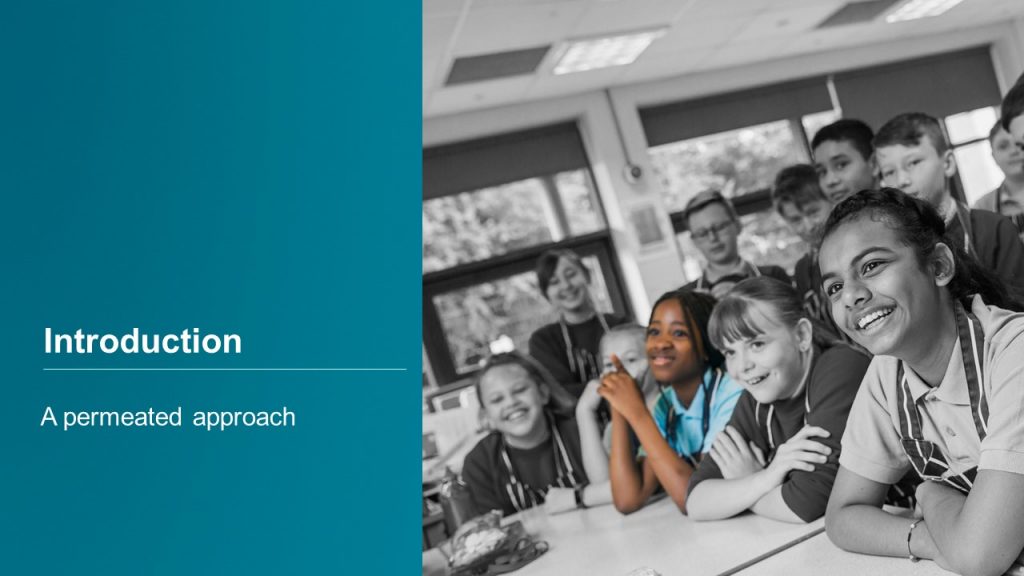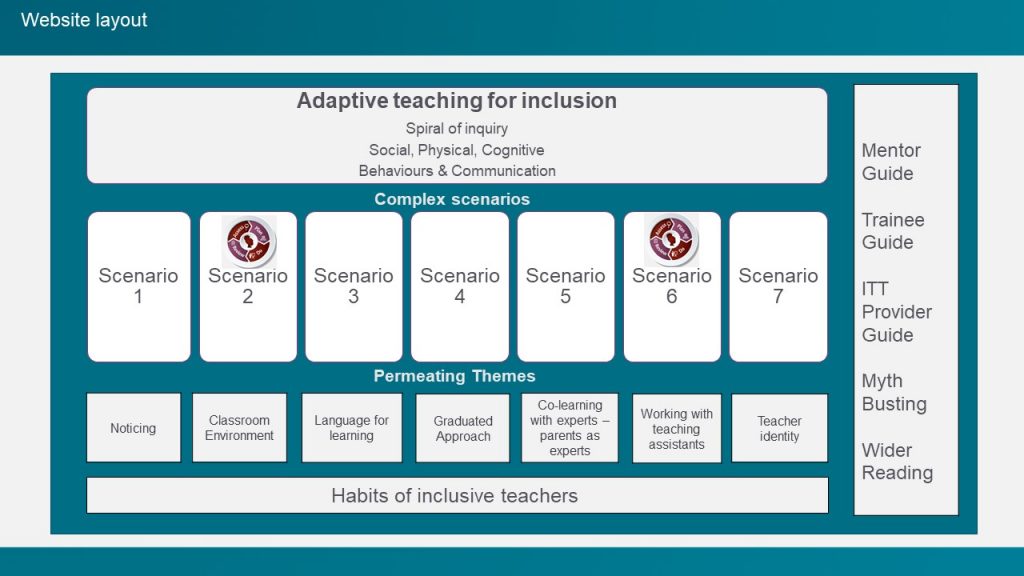Click on the slides below to view them
Below are the same slides with the slide comments:

This slide deck can be used by ITT Providers with their teams of ITE Tutors and school mentors to show how adopting a permeated curriculum approach to teaching about special educational needs as part of ITT is needed. 39% of pupils at some point in their school experience are identified with a special need and many more pupils who are not identified as having an SEND will struggle to learn. It’s important therefore, that novice teachers are taught to adapt their teaching and build relationships with all their learners from the very start of their teacher training programme.
Integrated inclusivity
According to the review by Sheffield Hallam Universisty of ITE in 2019 the curriculum for initial teacher education should support new teachers to better understand how to work with diverse student groups. The literature review described the integration of inclusivity (what this resource refers to as a permeated approach to inclusion) was discussed as a lacking in ITE currently.
‘There appears to be a lack of awareness in pre-service teachers in terms of effective ways of differentiating instruction where appropriate (Flores & Fernandes, 2014)’.
They went on to say that ideas about inclusion may be ‘grafted onto the course as distinct set of activities’, forced into the programme (Alexiadou & Essex, 2016, p16), rather than being integrated into all its ideas and principles. This resource provides a means of both integrating inclusivity by ensuring the principles and practice of working with diverse learners is weaved in or ‘permeated’ through the ITE curriculum and that SEND specifically is not addressed as a curriculum afterthought but as central to consideration i.e. considerations of instruction for SEND learners must be built in, not bolted on.
Teaching a class of 30 plus pupils is complex. When a new teacher arrives in a new school at beginning of Induction, they experience what research by Peter Hick and Joe Mintz have described as a ‘reality shock’. Having focused on getting their teaching right during their training year new teachers can feel overwhelmed by the diversity of pupils they are suddenly responsible for. In fact, many tell us they feel frightened at the thought of teaching solo and particularly anxious about having the knowledge and skills to teach pupils who have a special educational needs. ‘I haven’t had any training on how to teach pupils with Down Syndrome or Cerebral Palsy’. This leaves teachers feeling deskilled and can lead to them seeing these more complex pupils as a burden or not their responsibility.
As Dylan Wiliam explains, we have to develop classroom habits that help us improve our teaching every day. He refers to incremental formative assessment as one very important way of helping teachers to constantly review what’s working and for whom. It allows teachers to learn from their pupils by watching, asking questions, listening actively etc and respond by tweaking their teaching. The use of short cycle formative assessment (assess-plan-do-review) is the basis of the graduated approach which is championed in the resources on this site as a methodology or tool to support all learners, particularly those with SEND.
Teaching pupils with SEND can appear ‘harder’ more ‘difficult’ and some new teachers can even see this as problematic and not feel they have the time or knowledge to help. This can cause them to shy away from focusing on pupils who need more consideration, more help. This website hopes to provide the early career teacher with a very positive opportunity – the chance to see pupils who find learning ‘tricky’ as the most important focus for developing their professionalism. Focusing on the multiple challenges these pupils can experience in the classroom and reflecting on this with mentors can support teachers develop their knowledge of problem solving in action. By focusing on pupils who find it difficult to access the curricula, novice teachers learn to identify and adapt to diverse pupil needs and their differing start points from the start of their initial teacher training.
By focusing on the acute challenges some pupils experience in the classroom we can build the confidence and knowledge of new teachers to adapt their teaching to support pupil progress from their first days in the classroom and address this ‘reality shock’ that Mintz and Hick describe. In this way new teachers will be better equipped to take responsibility for all their learners rather than seeing them as the responsibility of the SENCO.
This website is a resource designed to support early career teachers to develop effective and inclusive habits.
The focus and the learning experiences available on this site are designed to offer trainee and new teachers the opportunity to work with their mentors and their tutors (in universities or SCITTs) to work together sharing and exploring teaching for pupils who find learning difficult. This can apply to all children at some point during their time in education. The ambition of this site is to provide situational classroom case studies and scenarios that are particularly complex. These situations contain examples of teachable moments – times when with the help of a mentor we can ‘stop the clock’ and consider why this child is struggling, failing to make the progress. We will ‘zoom in’ and take a forensic look at what is happening for that child and for his or her peers. We will practice ‘noticing’ extending the skills to observe, label and identify what learning challenges exist. Working together mentor and trainee will develop strategies for collecting more evidence and intelligence to understand the different social, academic and environmental influences that are affecting the child and their learning.
The case studies and the various themed sections of the site will pose dilemmas for new teachers to overcome using multiple strategies. Helping them to build confidence in their own capacity to problem solve, to test out their own hypotheses and to trial various instructional approaches.
Trainee Teachers come into the profession with a passion and ambition to make a difference to all pupils.
ITT Providers and School Mentors share those same goals.
Recent reviews of ITT suggest inadequate preparation of new teachers to support learners with SEND.
Perhaps we’ve been asking the wrong questions to gauge early career teachers’ preparedness for the classroom. Rather than ‘How ready do you feel to teach children with special educational needs?’, we should be asking ‘How skilled are you to notice when learning is effective?’ and ‘How prepared are you to adapt your teaching and/or the environment, to better enable groups and individuals to make progress?’
This type of questions would focus our solutions on teaching and learning, rather than the ‘magic wand’ implied by having a thorough knowledge of diagnosed conditions. Knowing about conditions and disabilities is interesting and can provide professional development but is not essential to meeting the needs of learners in the classroom. This resource re-frames how we approach the training of teachers in meeting the special educational needs of pupils.
Trainee Teachers come into the profession with a passion and ambition to make a difference to all pupils. ITT Providers and School Mentors share those same goals. The challenge we face is that many new teachers don’t feel equipped to offer quality teaching for pupils with SEND.

The core module focuses on developing adaptive teaching. A synthesis of the evidence base for developing adaptive skills of teachers. The resource pack is designed to use flexibly across the ITT curriculum rather than a distinct or modular approach to the teaching of pupils with special educational needs.
The Carter Review in 2015 argued the teacher training for SEND was inadequate.
Recent evidence from EEF (Education Endowment Foundation) tells us what makes the biggest difference to pupils with SEND is quality teaching. Quality teaching is adaptive and inclusive, so we need to strengthen ITE curriculums with enriched focus on developing the knowledge to adapt and include all learners.
Views of early career teachers.
I have 3 autistic children and two dyslexics in my class. I don’t have the expertise to teach these pupils.
This assumes children with SEND are all low attainers across the board. It assumes pupils with SEND are different from others. It asks us to teach pupils with SEND differently. EEF research tells us pupils with SEND would benefit most from quality teaching. So rather than consider a session or a module on SEND during the teacher training year or during induction, we must look at how all aspects of the ITE curriculum and the Early Career Framework can improve the quality and inclusivity of teaching. We need to adopt a permeated approach that builds consideration of SEND pupils and SEND Teaching in to the curriculum, rather than ‘bolt it on’ as an after thought
When SEND is a curriculum ‘bolt on’ it suggests not only are pupils with SEND somehow different and separate but also the way we teach them must also be different.
Understanding the risks/the red flags and the struggle to learn should not be part of a discreet programme of study aligned to the label of SEND but should be explored within each of the themes that support teacher development. A good teacher in every classroom – https://files.eric.ed.gov/fulltext/EJ750647.pdf
The tactic – builds confidence and competence around the goal of inquiry and knowledge building rather than specialist pedagogy that needs to develop in tandem with effective teaching.
The challenge here is most helpfully viewed through the lens of the evidence around ‘reality shock’* – ie we need to strengthen the clinical practice around inclusivity – the work that is happening in school that can undermine or support the belief system developed by the early career teachers. *Minz et al, 2020, The reality of reality shock for inclusion, in Teaching and Teacher Education. Vol. 91
The tactic – builds confidence and competence around the goal of inquiry and knowledge building rather than specialist pedagogy that needs to develop in tandem with effective teaching. Great mentoring supports the development of adaptive expertise.
Conceptual tools or resources?
It’s about both and how to make this easy not difficult – complexity can often be seen to be the enemy of progress, but it is important to note that this doesn’t have to be a binary discourse – an either or or: It can be both. We want new teachers to see complexity as a gift to their developing professionalism, an incredible learning opportunity. Pupils with typical development profiles will make educational progress no matter what we as teachers do, so our real expertise develops in our support of pupils who are atypical, those who struggle to learn.
Focusing on the learner – using an inquiry approach to build our forensic knowledge of the learner (noticing, listening, questioning, testing and challenging) and grow the evidence we hold that helps us formatively plan our teaching.
Habits are a great way to get a desired behaviour into your everyday teaching.
Habits are about moving from conscious competence to unconscious competence.
The goal is an automatic response. You set your habit up, and the new behaviour gets wired in.
As you work through this website, as a trainee teacher or an experienced mentor we hope to support the opportunity to develop new or signpost and recognise old, well formed inclusive habits and have the opportunity to celebrate and continually refine these.
Even once you have developed habits, your practice continues to evolve as a teacher.
A Practice is a commitment to stay conscious as you do the work, so you move between conscious incompetence and conscious competence. Sometimes what you’re doing works, sometimes it doesn’t work, but in both cases you’re reflecting and learning.